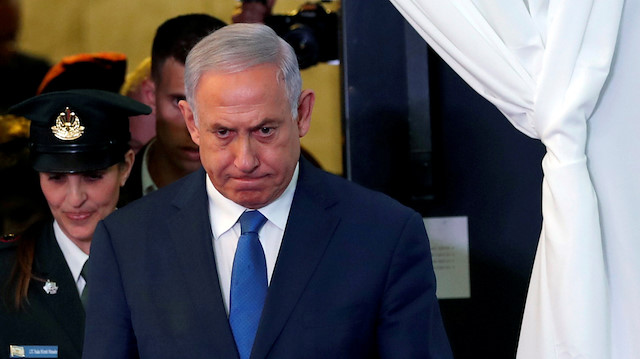

FILE PHOTO: Israeli Prime Minister Benjamin Netanyahu
History marks Netanyahu as first Israeli premier to be indicted while in office
Having failed to establish a coalition government, Israeli Prime Minister Benjamin Netanyahu faces a tough road ahead after being formally charged with various crimes.
On Thursday, Israeli Attorney General Avichai Mandelblit indicted Netanyahu on charges including bribery, fraud and breach of trust.
The coalition crisis in Israel has not been resolved despite two snap elections, and now the political uncertainty has deepened with Netanyahu’s indictment.
How will the process proceed?
Following the attorney general’s decision, Netanyahu needs to apply to the Knesset, the country’s parliament, with a request for immunity.
But even if he does, a decision is not likely to be made quickly as a coalition government has still not been formed and snap elections might be on the horizon again.
As a result, parliament is unable to assemble the Committee of Interior Affairs, the body that would discuss Netanyahu's immunity.
On Thursday, President Reuven Rivlin assigned the duty of establishing a coalition government to parliament as Netanyahu and his chief challenger Benny Gantz, head of the Blue and White alliance of centrist parties, failed in the task.
If parliament’s 120 members are unable to find within 21 days someone among themselves supported by an absolute majority who is willing to form a governing coalition, Israel will hold a third round of elections, meaning voters will cast their ballots in March 2020.
Only then, when a government is formed following the election, will parliament or the Committee of Interior Affairs decide on Netanyahu's immunity.
Prosecutors cannot file a lawsuit against Netanyahu if parliament sides with his immunity. But even if Netanyahu’s bid for immunity is rejected, his earliest court hearing is expected to be in May 2020.
Netanyahu to remain premier
In line with Israeli laws, the prime minister has the right to maintain their position until being found guilty, even when they are indicted. Hence, there are no conditions that would prompt Netanyahu to step down now.
Ehud Olmert, who served as prime minister from 2006 to 2009, was accused of accepting bribes during his term as mayor of Jerusalem from 1993 to 2003 and as minister of trade and industry from 2003 to 2006. He received a six-year prison sentence in 2014, which was later reduced to 19 months.
Olmert was put behind bars in February 2016 and was released in July 2017.
Charges against Netanyahu
Netanyahu will face three cases against him.
The first one, known as “Case 1000,” involves Israeli Hollywood producer Arnon Milchan, who was allegedly asked to purchase luxury items for Netanyahu and his wife. The Israeli prime minister was charged with breach of public trust and fraud. It is claimed that from 2007 to 2016, Netanyahu received gifts worth $283,000 from Milchan and other wealthy businessmen to advance their interests.
The second case, dubbed “Case 2000”, involves a deal with Arnon Mozes, publisher of the prominent Hebrew language daily Yedioth Ahronoth, in which Netanyahu asked for positive media coverage in exchange for help in reigning in a rival publication. Netanyahu was again charged with breach of public trust and fraud.
In the third case, known as “Case 4000,” Netanyahu was charged with bribery for allegedly granting regulatory benefits to Israeli telecom company Bezeq in return for favorable coverage of him and his wife on a news website owned by the company. The indictment centers on suspicions that confidants of Netanyahu promoted regulations worth hundreds of millions of dollars to the company.
#Benjamin Netanyahu
#breach of public trust
#bribery
#charges
#fraud
#Israel
#indictment
#Prime Minister

